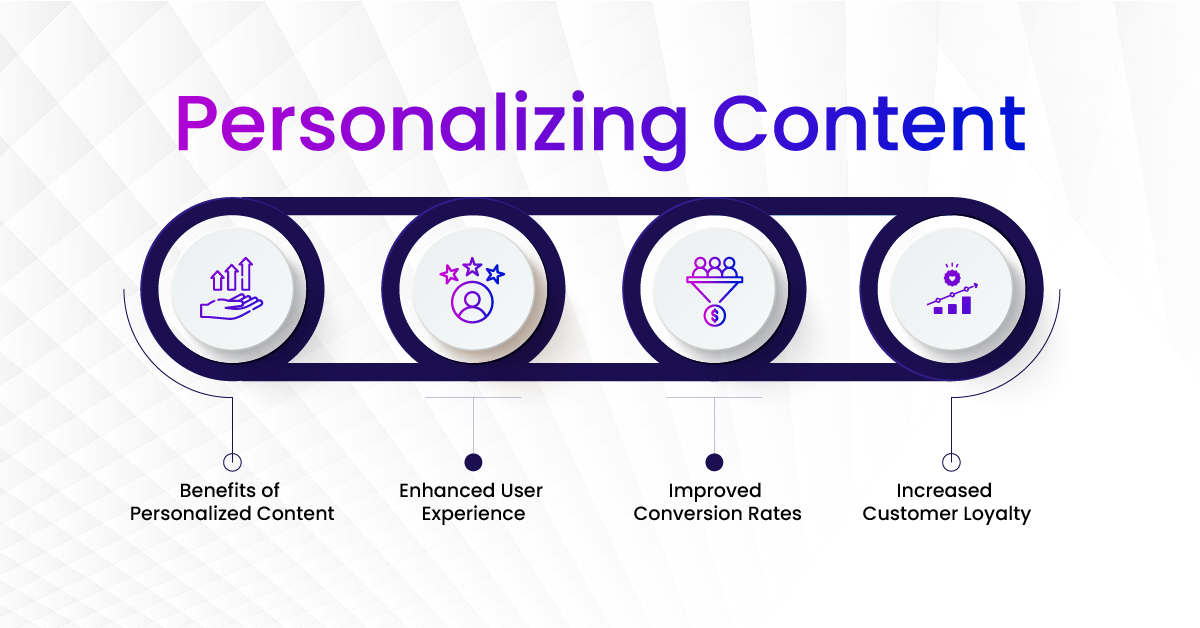5 min read

Personalization has become a key driver of customer engagement and conversion in today’s digital landscape. It allows businesses to tailor their content marketing strategies to meet individual users’ unique preferences and needs. However, privacy concerns have also increased, with users becoming increasingly aware of the data collected and used to personalize their online experiences. This blog post will explore the importance of finding the perfect balance between personalization and privacy in cookie policies. We will delve into the concept of cookie management, discuss the challenges and benefits of personalizing content and marketing, and provide insights into personalized digital advertising.
Table of Contents
Cookie Policy Management
What are Cookies?
When a user visits a website, tiny text files called cookies are saved on their device. They contain information about the user’s browsing behavior, preferences, and other relevant data. Cookies serve various purposes, such as remembering user preferences, enhancing the user experience, and enabling personalized content and marketing.
Importance of Cookie Management
Cookie management refers to controlling and regulating the use of cookies on a website. Businesses must implement effective cookie management practices to ensure compliance with privacy regulations, protect user data, and maintain trust with their audience.
Transparency and Consent
One key aspect of cookie management is providing transparency and obtaining user consent. Websites should inform users about the cookies used, their purpose, and how they can opt out or manage their preferences. This transparency builds trust with users and empowers them to make informed decisions about their online privacy.
Data Protection
Effective cookie management includes measures to protect user data. This involves implementing secure storage methods, encrypting sensitive information, and regularly reviewing and updating security protocols. By prioritizing data protection, businesses can mitigate the risk of data breaches and maintain user trust.
Cookie Lifespan
Cookie lifespan refers to the duration for which cookies remain active on a user’s device. Implementing appropriate cookie lifespan policies ensures that cookies are only retained for as long as necessary. Regularly expiring or deleting no longer required cookies helps minimize the amount of data stored on users’ devices, reducing privacy concerns.
Personalizing Content
Benefits of Personalized Content
Personalized content refers to tailoring website content, such as articles, product recommendations, and advertisements, to match individual users’ interests, preferences, and behaviors. The benefits of personalized content include:
Enhanced User Experience
By offering content that is relevant and interesting to users, personalized content enhances their overall experience on a website. It increases engagement, reduces bounce rates, and encourages users to explore the site more.
Improved Conversion Rates
Higher conversion rates have been demonstrated by personalized content. Businesses can effectively guide users toward purchasing or taking a desired action by presenting tailored recommendations and offers based on their past behavior or preferences.
Increased Customer Loyalty
When users feel that a website understands their needs and provides personalized recommendations or content, it fosters a sense of loyalty. They are more likely to return to the site, recommend it to others, and become repeat customers.
Balancing Personalization with Privacy
While personalizing content offers numerous benefits, it is essential to balance personalization and privacy. Some tactics to attain this equilibrium are as follows:
Collecting Only Relevant Data
To respect user privacy, businesses should only collect the data necessary for personalization purposes. This means avoiding excessive data collection and ensuring the collected information is directly related to enhancing the user experience.
Anonymizing Data
Anonymizing data involves removing personally identifiable information (PII) from user profiles or behavioral data. This ensures that even if unauthorized parties access the data, it cannot be linked back to individual users.
Providing Opt-Out Options
Respecting user preferences is crucial to maintaining a balance between personalization and privacy. Websites should offer clear opt-out options for users who do not wish to use their data for personalization. Providing these options builds trust and demonstrates a commitment to user privacy.
Personalizing Marketing Strategies

Benefits of Personalized Marketing
Personalized marketing involves tailoring marketing messages, campaigns, and offers to meet individual users’ needs and preferences. The benefits of personalized marketing include:
Improved Engagement
Personalized marketing messages have a higher chance of capturing users’ attention, as they are more relevant and appealing. This leads to increased engagement with marketing campaigns and a higher likelihood of conversion.
Higher Conversion Rates
Businesses can significantly increase their conversion rates by delivering targeted marketing messages based on user behavior or preferences. Personalized offers resonate better with users, making them more likely to take action.
Enhanced Customer Satisfaction
When marketing messages align with users’ interests and needs, it enhances their overall satisfaction with the brand. They feel understood and valued as customers, leading to stronger brand loyalty.
Addressing Privacy Concerns in Personalized Marketing
To address privacy concerns while implementing personalized marketing strategies, consider the following approaches:
User Consent and Control
Obtaining user consent for personalized marketing is crucial. Businesses should communicate how their data will be used for marketing purposes and provide opt-out options for those who do not wish to receive personalized marketing messages.
Data Security Measures
Implement robust data security measures to protect user data from unauthorized access or breaches. Regularly review security protocols, encrypt sensitive information, and adhere to best practices in data protection.
Honoring User Preferences
Respecting user preferences is key to balancing personalization with privacy in marketing. Provide users with easy-to-use preference centers where they can select their marketing preferences or opt out of specific types of communication.
Personalized Digital Advertising
Benefits of Personalized Digital Advertising
Personalized digital advertising involves tailoring advertisements based on the user’s interests, demographics, or past behavior. The benefits of personalized digital advertising include:
Higher Ad Relevance
Personalized digital advertising ensures higher relevance by delivering ads that align with users’ interests or needs. Users are more likely to engage with ads that resonate with them, leading to increased click-through rates and conversions.
Cost Efficiency
Personalized digital advertising allows businesses to target specific audiences more accurately. This precision targeting reduces ad waste, making advertising campaigns more cost-efficient.
Improved Return on Investment (ROI)
Personalized digital advertising has been shown to deliver a higher ROI compared to generic advertising approaches. Businesses can maximize their advertising budget and achieve better results by reaching the right audience with relevant ads.
Protecting User Privacy in Personalized Digital Advertising
To protect user privacy while implementing personalized digital advertising strategies:
Use Anonymized Data
Avoid using personally identifiable information (PII) in ad targeting. Instead, focus on anonymized data that cannot be linked back to individual users.
Adhere to Privacy Regulations
Stay updated with privacy regulations such as GDPR (General Data Protection Regulation) or CCPA (California Consumer Privacy Act). Ensure compliance with these regulations when collecting and using user data for personalized advertising.
Provide Opt-Out Options
Offer clear opt-out options for users who do not wish to see personalized ads. This empowers users to control their ad experience and respects their privacy preferences.
Conclusion
Finding the perfect balance between personalization and privacy in cookie policies is crucial for businesses operating in today’s digital landscape. Businesses can achieve personalization without compromising user privacy by implementing effective cookie management practices, respecting user preferences, and prioritizing data protection. Whether personalizing content, marketing strategies, or digital advertising, maintaining this balance will foster trust with users while driving engagement, conversion rates, and overall business success.
Published: January 9th, 2024








